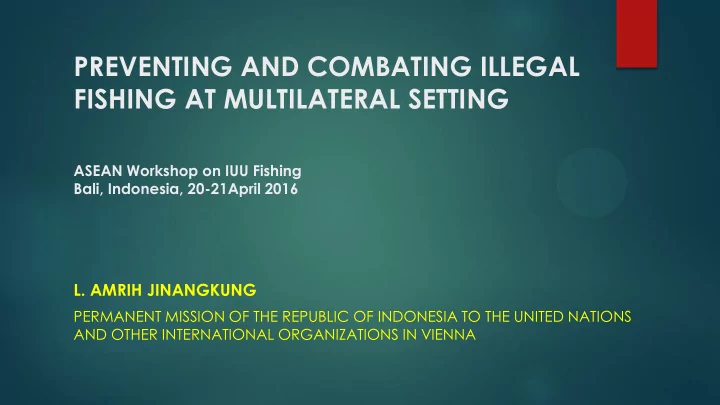

PREVENTING AND COMBATING ILLEGAL FISHING AT MULTILATERAL SETTING ASEAN Workshop on IUU Fishing Bali, Indonesia, 20-21April 2016 L. AMRIH JINANGKUNG PERMANENT MISSION OF THE REPUBLIC OF INDONESIA TO THE UNITED NATIONS AND OTHER INTERNATIONAL ORGANIZATIONS IN VIENNA
Illegal, Unreported, and Unregulated Fishing the magnitude of the adverse impact of IIUF to the economy and the environment Involving cross border actors Inadequate national, regional and international respond
> Illegal > unreported > unregulated Three distinct component of different nature Requires different respond Involving wide range of stakeholders Legal and administrative actions Definition? Crime?
Illegal fishing (FAO, 2001) fishing which is conducted by national or foreign vessels in waters under the jurisdiction of a state, without the permission of that state, or in contravention of the laws and regulations of that state. fishing which violates the laws, regulations, and conservation and management measures adopted by a fishing vessel’s flag state, or which generally violates national laws or international obligations, the obligations of cooperating states to relevant regional fisheries management organizations examples: fishing without a license, fishing in a closed area or marine protected area (MPA), fishing with prohibited gear, fishing over a quota, or the fishing of prohibited species
Unreported fishing (FAO-2001) fishing activities which have not been reported, or have been misreported, to the relevant national authority, in contravention of national laws and regulations similar lack of reporting or misreporting to regional fisheries management organizations examples : keeping two logs -an official log for the inspectors and a ‘confidential’ log for the owner-, under-report harvests, falsely record vessel locations, or offload fish at ports with low regulatory and inspections standards (ports of convenience)
Unregulated fishing (FAO, 2001) fishing conducted by vessels without nationality, or those flying the flag of a country not party to a RFMO within the jurisdiction of that RFMO more generally, fishing in a manner which contravenes the regulations of the RFMO examples: fishing in areas or for fish where there are no applicable conservation or management measures
Transnational organized crime - UNTOC Serious crime (defined in Art. 2 (b) Transnational in nature (art. 3 (2) Involving an organized criminal group (Art. 2 (a) Offences (Art. 5, 6, 8, 23): participation in an organized criminal group, laundering proceeds of crime, corruption, obstruction of justice
Illegal fishing: transnational organized crime? Lack of definition should not prevent respond Focus on the “crime” aspect of IUUF - the fisheries crimes embedded especially on the illegal fishing Closer look at the whole value chain
Transnational organized fisheries crime – Indonesian perspectives collaboration of more than 2 people commission of serious criminal offences for an indefinite period of time determined by the pursuit of profit and / or power using commercial or business structures operating at international level
Transnational organized fisheries crime – multilateral setting Lack of awareness, despite the huge adverse impact of fisheries crime Different interests and perspective among states The need to build common understanding, and action Lack of definition, narrow perspective
Transnational organized fisheries crime – our efforts Raising awareness, keeping the issue alive – UNODC, CCPCJ Developing forum for discussion and talk – friends of fisheries Bringing the issue at higher plane Engaging further dialog, building common understanding and cooperation
THANK YOU
Recommend
More recommend